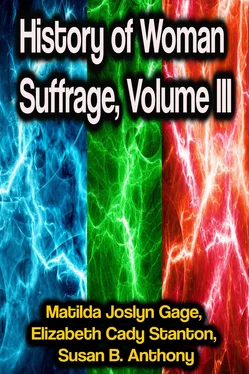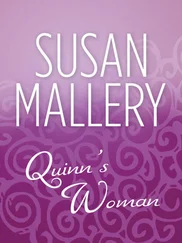To all who are more serious in their opposition to the movement, we would remind them of the words of a few distinguished men:—
I go for all sharing the privileges of the government who assist in bearing its burdens, by no means excluding women.—[Abraham Lincoln.
I believe that the vices in our large cities will never be conquered until the ballot is put into the hands of women.—[Bishop Simpson.
I do not think our politics will be what it ought to be till women are legislators and voters.—[Rev. James Freeman Clarke.
Women have quite as much interest in good government as men, and I have never heard or read of any satisfactory reason for excluding them from the ballot-box; I have no more doubt of their ameliorating influence upon politics than I have of the influence they exert everywhere else.—[George William Curtis.
In view of the terrible corruption of our politics, people ask, can we maintain universal suffrage? I say no, not without women. The only bear-gardens in our community are the town-meeting and the caucus. Why is this? Because these are the only places at which women are not present.—[Bishop Gilbert Haven.
I repeat my conviction of the right of woman suffrage. Because suffrage is a right and not a grace, it should be extended to women who bear their share of the public cost, and who have the same interest that I have in the selection of officials and the making of laws which affect their lives, their property, and their happiness.—[Governor Long of Massachusetts.
However much the giving of political power to woman may disagree with our notions of propriety, we conclude that, being required by that first prerequisite to greater happiness, the law of equal freedom, such a concession is unquestionably right and good.—[Herbert Spencer.
In the administration of a State neither a woman as a woman, nor a man as a man has any special functions, but the gifts are equally diffused in both sexes. The same opportunity for self-development which makes man a good guardian will make woman a good guardian, for their original nature is the same.—[Plato.
It has become a custom, almost universal, to invite and to welcome the presence of women at political assemblages, to listen to discussions upon the topics involved in the canvass. Their presence has done much toward the elevation, refinement, and freedom from insincerity and hypocrisy, of such discussions. Why would not the same results be wrought out by their presence at the ballot-box? Wherever the right has been exercised by law, both in England and this country, such has been its effect in the conduct of elections.
The framers of our system of government embodied in the Declaration of Independence the statement that to secure the rights which are therein declared to be inalienable and in respect to which all men are created equal, "governments are instituted among men deriving their just powers from the consent of the governed." The system of representative government they inaugurated can only be maintained and perpetuated by allowing all citizens to give that consent through the medium of the ballot-box—the only mode in which the "consent of the governed" can be obtained. To deny to one-half of the citizens of the republic all participation in framing the laws by which they are to be governed, simply on account of their sex, is political despotism to those who are excluded, and "taxation without representation" to such of them as have property liable to taxation. Their investiture with separate estates leads, logically and necessarily, to their right to the ballot as the only means afforded them for the protection of their property, as it is the only means of their full protection in the enjoyment of the immeasurably greater right to life and liberty. To be governed without such consent is clear denial of a right declared to be inalienable.
It is said that the majority of women do not desire and would not exercise the right, if acknowledged. The assertion rests in conjecture. In ordinary elections multitudes of men do not exercise the right. It is only in extraordinary cases, and when their interests and patriotism are appealed to, that male voters are with unanimity found at the polls. It would doubtless be the same with women. In the exceptional instances in which the exercise of the right has been permitted, they have engaged with zeal in every important canvass. Even if the statement were founded in fact, it furnishes no argument in favor of excluding women from the exercise of the franchise. It is the denial of the right of which they complain. There are multitudes of men whose vote can be purchased at an election for the smallest and most trifling consideration. Yet all such would spurn with scorn and unutterable contempt a proposition to purchase their right to vote , and no consideration would be deemed an equivalent for such a surrender. Women are more sensitive upon this question than men, and so long as this right, deemed by them to be sacred, is denied, so long the agitation which has marked the progress of this contest thus far will be continued.
Entertaining these views, your committee report back the proposed resolution without amendment for the consideration of the Senate, and recommend its passage.
E. G. Lapham,
T. M. Ferry,
H. W. Blair.
The constitution is wisely conservative in the provision for its own amendment. It is eminently proper that whenever a large number of the people have indicated a desire for an amendment, the judgment of the amending power should be consulted. In view of the extensive agitation of the question of woman suffrage, and the numerous and respectable petitions that have been presented to congress in its support, I unite with the committee in recommending that the proposed amendment be submitted to the States.
H. B. Anthony.
June 5, 1882, Mr. George, from the Committee on Woman Suffrage, submitted the following views of the minority:
The undersigned are unable to concur in the report of the majority recommending the adoption of the joint resolution proposing an amendment to the Constitution of the United States, for reasons which they will now proceed to state.
We do not base our dissent upon any ground having relation to the expediency or inexpediency of vesting in women the right to vote. Hence we shall not discuss the very grave and important social and political questions which have arisen from the agitation to admit to equal political rights the women of our country, and to impose on them the burden of discharging, equally with men, political and public duties. Whether so radical a change in our political and social system would advance the happiness and welfare of the American people, considered as a whole, without distinction of sex, is a question on which there is a marked disagreement among the most enlightened and thoughtful of both sexes. Its solution involves considerations so intimately pertaining to all the relations of social and private life—the family circle—the status of women as wives, mothers, daughters, and companions, to the functions in private and public life which they ought to perform, and their ability and willingness to perform them—the harmony and stability of marriage, and the division of the labors and cares of that union—that we are convinced that the proper and safe discussion and weighing of them would be best secured by deliberations in the separate communities which have so deep an interest in the rightful solution of this grave question. Great organic changes in government, especially when they involve, as this proposed change does, a revolution in the modes of life, long-standing habits, and the most sacred domestic relations of the people, should result only upon the demand of the people, who are to be affected by them. Such changes should originate with, and be molded and guided in their operation and extent by, the people themselves. They should neither precede their demand for them, nor be delayed in opposition to their clearly expressed wishes. Their happiness, their welfare, their advancement, are the sole objects of the institution of government; of these they are not only the best, but they are the exclusive judges. They have commissioned us to exercise for their good the great powers which they have intrusted to us by their letter of attorney, the constitution; not to assume to ourselves a superior wisdom, or usurp a guardianship over them, dictating reforms not demanded by them, and attempting to grasp power not granted.
Читать дальше












